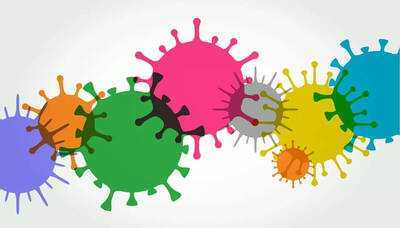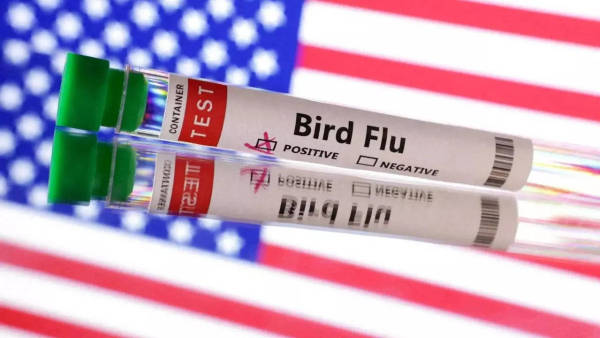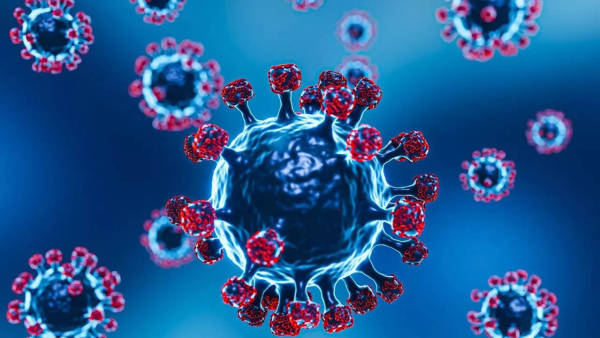
Every year the 'tripledemic' of viruses triggered by flu, Covid-19, and RSV raise infections in the United States. Spread via the same route - respiratory droplets - when people cough, sneeze, or talk, the common symptoms of these infections are also similar. In winters, it's common for respiratory infections to grow as people remain indoors and that makes it easier for viruses to spread. However, this year, a couple of surprising new entrants have caused panic among people as well as health officials.
While Norovirus formed part of the 'quad-demic' this season, the concern around human cases of bird flu is also growing with a new strain in picture. As per the latest reports, six dairy herds in Nevada have tested positive for a newer variant of the H5N1 bird flu virus that’s been associated with severe infections in humans, according to the Nevada Department of Agriculture. The strain previously found only in wild birds has turned up in dairy herds in Nevada raising concerns that future human infections could be more serious. Bird flu spreads through close contact with infected birds or their droppings. It also spreads through contaminated surfaces or by breathing in the virus.
Scientists have warned about the possibility of a new pandemic, if bird flu mutations continue to grow rapidly.
In the middle of the intensifying flu and respiratory season, let's understand the difference between three key infections - bird flu, Covid and influenza .
Bird flu

Bird flu is also known as avian flu or influenza. It primarily affects domestic poultry and is caused by a virus called Influenza A and has various subtypes- H5N1, H7N9, H5N6, and H5N8.
"Avian viruses usually circulate among birds and infect mammals like pigs, but Influenza A virus is known to undergo certain changes in its genetic structure over time. Due to these changes the new strains that are created has capability to infect humans," says Dr Ashok Kumar, Associate Director & Head of Unit, Max Smart Super Speciality Hospital, Saket.
Symptoms
- Fever
- Headache, body ache
- Running nose
- Watery diarrhoea
- Chest and abdomen pain
- Severe symptoms include difficulty in breathing and severe chest infection
How it spreads
- Handling sick poultry
- Handling carcasses of infected birds
- Ingesting undercooked bird meat of infected birds
- Exposure to droplets generated by sneezing, coughing of already infected humans.
- Fomites: Touching the objects on which infective droplets settle like door handles, tumblers, etc
Covid-19

Covid-19 is caused by SARS-CoV-2 virus also named as Covid-19 virus. Coronaviruses also usually infect animals but when they undergo change in their genetic structure they become capable to infect humans as well as spread among humans. According to WHO, most people infected with the virus experience mild to moderate respiratory illness and recover without requiring special treatment. However, some can become seriously ill and require medical attention. Older people and those with underlying medical conditions like cardiovascular disease, diabetes, chronic respiratory disease, or cancer are more likely to develop serious illness. Anyone can get sick with Covid-19 and become seriously ill or die at any age.
How it spreads
Exposure to droplets generated in the respiratory tract of infected patients in the form of sneezing, or coughing. These droplets linger in the air for 6 feet and once inhaled by another person, the virus enters the body.
Fomites: Touching the objects on which infective droplets settle
Symptoms
Mild symptoms include fever, cough, loss of smell and taste sensation, weakness, body pain, headache, and diarrhea while severe symptoms include difficulty in breathing, drop in oxygen levels of blood, and respiratory distress.
Influenza or Flu

Influenza is a respiratory infection caused by influenza viruses, which are RNA viruses in the Orthomyxoviridae family. There are four types of influenza viruses: A, B, C, and D. Influenza A viruses are classified into subtypes based on surface proteins, with A(H1N1)pdm09 and A(H3N2) currently circulating in humans. Only type A viruses have caused pandemics. Influenza B viruses are categorized into B/Yamagata and B/Victoria lineages. Influenza C causes mild infections and is not a public health concern. Influenza D affects cattle and does not infect humans.
Most people with the flu get better on their own. But at times, it can cause severe complications, especially among vulnerable populations. To help protect against seasonal flu, you can get an annual flu shot. Though not 100% effective, it lowers the chances of having severe complications from the flu.
Signs and symptoms
- Stuffy and running nose
- Fever
- Headache
- Body pain
- Weakness
- Majority of the flu cases have milder symptoms that can be managed at home
- Severe cases may have difficulty in breathing
Which is more dangerous?
"Among the three, Covid-19 and bird flu are more problematic because they cause severe illness if contracted. As compared to the seasonal flu, Covid-19 is highly efficient in transmission but can lead to long-term illness. Bird flu, although the cases are small in human disease, is so much deadlier. The flu is very wide-spread as a common type, but with a self-limiting course it is less often severe," says Dr. Neha Rastogi Panda, Consultant-Infectious Diseases, Fortis Memorial Research Institute in Gurugram.
"All three of them are dangerous but Covid would be the most dangerous because we have already seen what Covid can do, says Dr. Pruthi Dhekane, Consultant - Infectious Disease, Manipal Hospital, Kharadi, Pune.
Precautionary measures to avoid these infections- Take vaccines on time. Three doses of Covid vaccines and annual influenza vaccines can prevent infection
- Avoid smoking
- Regular exercise and deep breathing exercises can help raise immunity
- A healthy and balanced diet can also help boost immunity against seasonal infections
- During the time of surge in these infections, it is advised to wash your hands thoroughly with soap or go for hand sanitisation
- Use masks to cover face and nose
- Cover nose and mouth during sneezing and coughing.
- Elderly and pregnant women must avoid crowded places during spread of infections
 Every year the 'tripledemic' of viruses triggered by flu, Covid-19, and RSV raise infections in the United States. Spread via the same route - respiratory droplets - when people cough, sneeze, or talk, the common symptoms of these infections are also similar. In winters, it's common for respiratory infections to grow as people remain indoors and that makes it easier for viruses to spread. However, this year, a couple of surprising new entrants have caused panic among people as well as health officials.
Every year the 'tripledemic' of viruses triggered by flu, Covid-19, and RSV raise infections in the United States. Spread via the same route - respiratory droplets - when people cough, sneeze, or talk, the common symptoms of these infections are also similar. In winters, it's common for respiratory infections to grow as people remain indoors and that makes it easier for viruses to spread. However, this year, a couple of surprising new entrants have caused panic among people as well as health officials.


